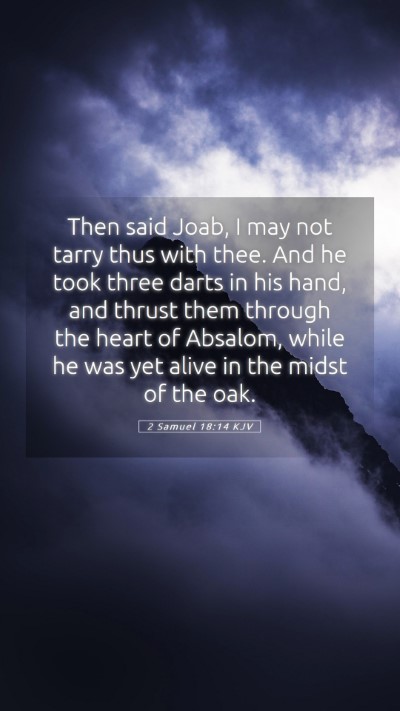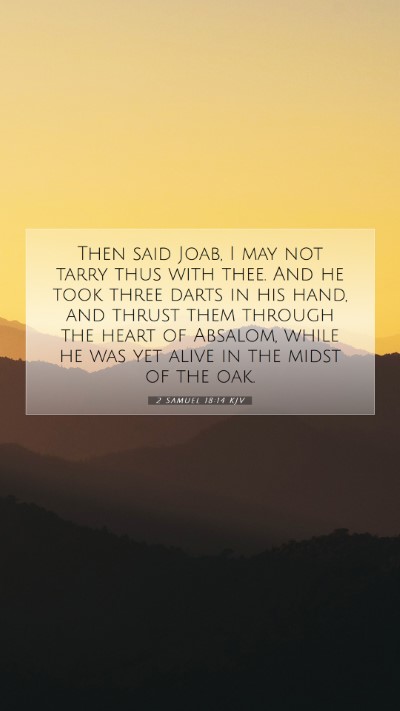Understanding 2 Samuel 18:14: An In-Depth Commentary
2 Samuel 18:14 captures a pivotal moment in David's life during the tumultuous period of Absalom's rebellion. This verse reads, "Then Joab said, 'I am not going to wait like this for you.' He took three javelins in his hand and plunged them into Absalom's heart. While Absalom was still alive in the oak tree." The events surrounding this verse are layered with historical context, emotional depth, and theological significance, which are essential for Bible verse meanings and Bible verse interpretations.
Contextual Background
This verse is set within a broader narrative where King David faces rebellion from his son, Absalom. The backdrop is crucial for Bible study insights as it reflects the consequences of David's earlier sin (2 Samuel 12:10-14). The rebellion represents a rejection of David's kingship and the fulfillment of prophetic judgment.
Commentary Insights
- Matthew Henry's Commentary: Henry emphasizes the gravity of Joab's actions. He reflects on the disobedience to David's wishes, as David had ordered that Absalom be spared (2 Samuel 18:5). Joab's ruthless action symbolizes the complexities of loyalty and authority within human relationships. It draws attention to the tragic consequences of rebellion, not only for Absalom but also for David, whose heart would be forever broken by the loss of his son.
- Albert Barnes' Notes: Barnes highlights the tension between duty and compassion. Joab's decision to kill Absalom, rather than taking him captive, reveals a significant turning point in the king's court. The narrative illustrates the internal conflicts that arise within familial relationships, reminding readers of the intense emotional struggles that accompany leadership and governance.
- Adam Clarke's Commentary: Clarke provides insight into the symbolic nature of the javelins. He argues that the javelins represent the finality of judgment. Absalom's fate was sealed by Joab's decisive act, emphasizing the theme of divine justice within the narrative. Clarke encourages readers to reflect on the implications of sin and rebellion against parental and divine authority, fostering a deeper understanding of Scripture.
Theological Implications
2 Samuel 18:14 poses significant theological questions about rebellion, mercy, and the consequences of sin. Joab's choice raises questions regarding the morality of his actions versus the duty to protect the king's family. The interplay between divine justice and human agency becomes crucial in examining Bible verse commentary and scripture analysis.
Significance of the Verse
This verse is a poignant reminder of how personal actions resonate within the scope of larger familial and societal relationships. The tragedy of Absalom invites us to reflect on the application of Bible verses to daily life. Each character's choices reflect the perpetual struggle between righteousness and the devastating consequences of personal and collective sin.
Application to Daily Life
In your Bible study groups or in online Bible study, consider how this passage provides a framework for discussing the tension between authority and compassion. How do we navigate our responsibilities towards those we love in times of conflict? The emotional depth in this narrative resonates with anyone facing family strife or conflict.
Related Bible Cross References
- 2 Samuel 12:10-14 - David's sin and the prophecy of judgment.
- 2 Samuel 18:5 - David’s command to treat Absalom gently.
- Luke 15:20-24 - The parable of the prodigal son illustrating forgiveness and grace.
Conclusion
This in-depth exploration of 2 Samuel 18:14 reveals rich theological, emotional, and moral layers in the narrative. By engaging with these insights, believers are encouraged to reflect on the complexities of human relationships, the nature of mercy, and the overarching themes of sin and repentance throughout Scripture. This understanding fosters a broader Bible verse understanding that can transform personal faith and community discussions.


